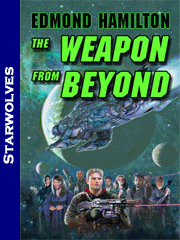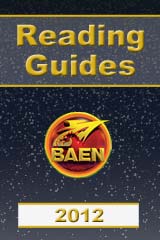Space Opera Apotheosis!
"Edmond Hamilton's 'The Man Who Evolved' was the first science fiction short story to permanently impress me," Isaac Asimov famously remarked.
And it wasn't just Asimov. Hamilton literally created space opera—and the flat-out weird, high-baroque far future that defines the genre. (Okay, to be truthful, we'd say he created it together with E.E.
by Edmond Hamilton
by Edmond Hamilton
by Edmond Hamilton
by Edmond Hamilton
by Edmond Hamilton
by Edmond Hamilton
Starwolves and the Interstellar Patrol
SKU: 1011250054
$24.00



Space Opera Apotheosis!
"Edmond Hamilton's 'The Man Who Evolved' was the first science fiction short story to permanently impress me," Isaac Asimov famously remarked.
And it wasn't just Asimov. Hamilton literally created space opera—and the flat-out weird, high-baroque far future that defines the genre. (Okay, to be truthful, we'd say he created it together with E.E.
The Weapon From Beyond by Edmond Hamilton
The Closed Worlds by Edmond Hamilton
World of the Starwolves by Edmond Hamilton
Crashing Suns by Edmond Hamilton
Outside the Universe by Edmond Hamilton
Battle for the Stars by Edmond Hamilton
The Weapon From Beyond
Morgan Chane was an Earthman by parentage, but he had been born on the pirate-world Varna, whose heavy gravity had developed strength and incredibly quick reflexes in him. When he was old enough, he joined the raider-ships that looted the starworlds, and fought side by side with the dreaded Starwolves of Varna. But then there was a fight among them. Chane killed their leader, and the other Starwolves turned on him. He barely got away alive—wounded near death, his Starwolf pursuers following him across the galaxy. And there was nowhere he could seek refuge, for no world would lift a hand to save one of the hated Starwolves.
The Closed Worlds
When Morgan Chane and his comrades of John Dilullo's interstellar mercenaries invaded the Close World of Arkuu in search of a lost Terran expedition, they found a planet of strange menace. Incredibly powerful monsters prowled though Arkuu's dense jungles, and the ghosts of the planet's past haunted its ancient deserted cities. The Arkuuns themselves fought grimly to drive the Terrans away. But at last Chane discovered the Free-Faring, the terrible alien secret of Arkuu . . . and suddenly he knew why no Terran had left the Closed Worlds alive.
World of the Starwolves
Morgan Chane was an Earthman by parentage, but he had been born on the pirate-world Varna, whose heavy gravity had developed strength and incredibly quick reflexes in him. When he was old enough, he joined the raider-ships that looted the starworlds, and fought side by side with the dreaded Starwolves of Varna. But then there was a fight among them. Chane killed their leader, and the other Starwolves turned on him. He barely got away alive—wounded near death, his Starwolf pursuers following him across the galaxy. And there was nowhere he could seek refuge, for no world would lift a hand to save one of the hated Starwolves.
Crashing Suns
From mighty Canopus, capital of the Federated Stars, to the outer fringes of our great galaxy, the Interstellar Patrol was on the watch. Rogue suns, marauding alien intelligences, man-made comets driven by their makers for the conquest of unsuspecting worlds, diabolical conspiracies hatched in the depths of unmapped nebulas—it was the business of the Patrol's mighty spaceships to guard against such cosmic dangers.
CRASHING SUNS is the epic account of this future space legion, where volunteers from a thousand worlds man the mighty starcraft of a hundred thousand years to come. It's interplanetary adventure on the classic scale, by the master hand of Edmond Hamilton.
Outside the Universe
"Spaceships in thousands, and they're attacking us! They've come from somewhere toward our galaxy—have come out of intergalactic space itself to attack our universe!"
The interstellar Patrol, that fabulous fleet manned by all the assorted races of our galaxy, faced its greatest struggle when that alarm came through. For this was an attack from OUTSIDE THE UNIVERSE, a vast migration from another galaxy, and it had to be stopped if a thousand worlds were to survive!
This terrific classic space novel on the grandest scale involves three giant galaxies in an all-out conflict.
Battle for the Stars
FOLLOWED IN SPACE!
The Starsong was beginning to pass between the two huge red binaries into the thicker sprawl of stars through which the channel led. The channel was not straight, and you could not take it too fast—in that swarm of suns the fabric of a ship could be torn apart in some deadly gravity drag or vaporized in collision. The only thing was that the Orionids were still following them.
But Birrel said nothing. This was Garstang's job and he let him do it. The enormous pairs of red suns flashed past them on either side and were gone, and they were in the channel. Under his feet he could feel the Starsong quiver, wincing and flinching like a live thing. On either side the overhanging cliffs of stars seemed to topple toward them. He looked upward at the nebula, like a glowing thundercloud roofing the channel, and then down at the shoaling suns below.
Garstang said flatly, "We didn't get away quite fast enough. They'll be barrelling in here after us and they'll have us in range before we ever get through the channel."
"As far as I can see," said Birrel, "we've only got one way out of it."
He looked up at the screens again, at the vast glow of the nebula overhead.
Garstang was silent for a moment. Then he said, "I hoped you wouldn't think of that."
Starwolves and the Interstellar Patrol
Edmond Hamilton
Space Opera Apotheosis!
"Edmond Hamilton's 'The Man Who Evolved' was the first science fiction short story to permanently impress me," Isaac Asimov famously remarked.
And it wasn't just Asimov. Hamilton literally created space opera—and the flat-out weird, high-baroque far future that defines the genre. (Okay, to be truthful, we'd say he created it together with E.E.
The Weapon From Beyond by Edmond Hamilton
The Closed Worlds by Edmond Hamilton
World of the Starwolves by Edmond Hamilton
Crashing Suns by Edmond Hamilton
Outside the Universe by Edmond Hamilton
Battle for the Stars by Edmond Hamilton
More books by Edmond Hamilton (16)
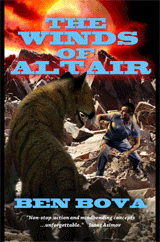
Ben Bova Spacetime Bundle
Ben Bova, science fiction legend. Editor of Analog magazine, and then original editor at fabled Omni. Winner of six Hugo awards, the creator of the best-selling Grand Tour series along with innumerable sparkling short stories. Here are six Bova classics now available in ebook for the first time. You'll find idea-filled science fiction, interplanetary exploration, virtual reality thrillers, along with alternate history time travel classics featuring eternal warrior Orion.
Ben Bova, science fiction legend. Editor of Analog magazine, and then original editor at fabled Omni. Winner of six Hugo awards, the creator of the best-selling Grand Tour series along with innumerable sparkling short stories. Here are six Bova classics now available in ebook for the first time. You'll find idea-filled science fiction, interplanetary exploration, virtual reality thrillers, along with alternate history time travel classics featuring eternal warrior Orion.
by Ben Bova
by Ben Bova
by Ben Bova
by Ben Bova
by Ben Bova
by Ben Bova



Cyberbooks
Computer genius Carl Lewis has invented the cyberbook, an electronic device that instantly and inexpensively brings the written word to the masses. But not everyone warms to Carl's ideas. Add corporate spies, authors threatening to strike, and a wave of mysterious murders, and you have Ben Bova at his best.Cyberbooks also appears in Laugh Lines

Computer genius Carl Lewis has invented the cyberbook, an electronic device that instantly and inexpensively brings the written word to the masses. But not everyone warms to Carl's ideas. Add corporate spies, authors threatening to strike, and a wave of mysterious murders, and you have Ben Bova at his best.
Cyberbooks also appears in Laugh Lines


Select the format you would like to download:
Download Unzipped Files
EPUB/Kindle/Apple iOS/Nook Format
Download Zip Files
EPUB/Kindle/Apple iOS/Nook Format Zip

Death Dream
It's the ultimate adult playground. Cyber World will use the latest technology in computer produced virtual reality to provide thrills and chills beyond any ever experienced at a theme park. Here children of all ages will live out their wildest fantasies: fly jet fighters in combat, take part in a gunfight in the OK Corral, play in the World Series, or take a walk on the moon or a trip inside the human body. One problem: in this virtual world, the visitors are dying in a very real way. Stunning SF from a six-time Hugo award winner.

It's the ultimate adult playground. Cyber World will use the latest technology in computer produced virtual reality to provide thrills and chills beyond any ever experienced at a theme park. Here children of all ages will live out their wildest fantasies: fly jet fighters in combat, take part in a gunfight in the OK Corral, play in the World Series, or take a walk on the moon or a trip inside the human body. One problem: in this virtual world, the visitors are dying in a very real way.
Stunning SF from a six-time Hugo award winner.


Select the format you would like to download:
Download Unzipped Files
EPUB/Kindle/Apple iOS/Nook Format
Download Zip Files
EPUB/Kindle/Apple iOS/Nook Format Zip
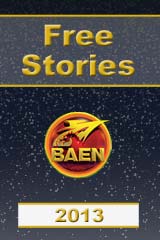
FREE
Free Short Stories 2013
Eleutherios by Sharon Lee and Steve Miller Seven Miles by T.C. McCarthy To Spec by Charles E. Gannon Skyspark by Ryk E. Spoor The Krumhorn and Misericorde by Dave Freer Pittsburgh Backyard and Garden by Wen Spencer Haunts of Guilty Minds by John Lambshead The Lamplighter Legacy by Patrick O'Sullivan Dog's Body by Sarah A. Hoyt The Sorcerer of Daigawa by Jon F. Merz Sweothi City by Larry Correia Out of True by Sharon Lee and Steve Miller Mars Farts by Ben Bova The Virgin of Hertogenbosch by David Drake Murder on the Hochflieger Ost by Frank Chadwick
FREE
 Frank Chadwick
Frank Chadwick  Larry Correia
Larry Correia  David Drake
David Drake  Dave Freer
Dave Freer  Charles E. Gannon
Charles E. Gannon  Sarah A. Hoyt
Sarah A. Hoyt  John Lambshead
John Lambshead  Sharon Lee
Sharon Lee  Jon F. Merz
Jon F. Merz  Steve Miller
Steve Miller  Wen Spencer
Wen Spencer  Ryk E. Spoor
Ryk E. Spoor 
Eleutherios
by Sharon Lee and Steve Miller
Seven Miles
by T.C. McCarthy
To Spec
by Charles E. Gannon
Skyspark
by Ryk E. Spoor
The Krumhorn and Misericorde
by Dave Freer
Pittsburgh Backyard and Garden
by Wen Spencer
Haunts of Guilty Minds
by John Lambshead
The Lamplighter Legacy
by Patrick O'Sullivan
Dog's Body
by Sarah A. Hoyt
The Sorcerer of Daigawa
by Jon F. Merz
Sweothi City
by Larry Correia
Out of True
by Sharon Lee and Steve Miller
Mars Farts
by Ben Bova
The Virgin of Hertogenbosch
by David Drake
Murder on the Hochflieger Ost
by Frank Chadwick

 Frank Chadwick
Frank Chadwick  Larry Correia
Larry Correia  David Drake
David Drake  Dave Freer
Dave Freer  Charles E. Gannon
Charles E. Gannon  Sarah A. Hoyt
Sarah A. Hoyt  John Lambshead
John Lambshead  Sharon Lee
Sharon Lee  Jon F. Merz
Jon F. Merz  Steve Miller
Steve Miller  Wen Spencer
Wen Spencer  Ryk E. Spoor
Ryk E. Spoor 
Select the format you would like to download:
Download Unzipped Files
EPUB/Kindle/Apple iOS/Nook Format
Download Zip Files
EPUB/Kindle/Apple iOS/Nook Format Zip
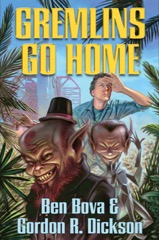
Gremlins Go Home
TWO MASTERS OF HUMOROUS SCIENCE FICTION TOGETHER! Elves. Leprechauns. Gremlins. Call them what you like. These little dudes may be the stuff of legend, but they're just as real as you and me. Far from the mythical, magical creatures of rumor, they are actually tiny aliens, marooned for centuries on this miserable mudball known as Earth. And they want just one thing: OFF! Now, human technology may finally make a reality of their dreams to leave this pathetic planet behind. NASA has a new rocket and it's Mars-bound. All the gremlins need do is hijack it and set a course for their homeworld of Gremla. The only thing lacking is a hapless human accomplice . . .
TWO MASTERS OF HUMOROUS SCIENCE FICTION TOGETHER!
Elves. Leprechauns. Gremlins. Call them what you like.
These little dudes may be the stuff of legend, but they're just as real as you and me. Far from the mythical, magical creatures of rumor, they are actually tiny aliens, marooned for centuries on this miserable mudball known as Earth. And they want just one thing: OFF!
Now, human technology may finally make a reality of their dreams to leave this pathetic planet behind. NASA has a new rocket and it's Mars-bound. All the gremlins need do is hijack it and set a course for their homeworld of Gremla.
The only thing lacking is a hapless human accomplice . . .

Select the format you would like to download:
Download Unzipped Files
EPUB/Kindle/Apple iOS/Nook Format
Download Zip Files
EPUB/Kindle/Apple iOS/Nook Format Zip
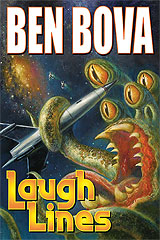
Laugh Lines
The Future is Coming, and It’s Going to be Hilarious! First Time in Paperback for This Wildly Comic Look by a Best-Selling and Award-Winning Writer at Several Possible—and Bizarre—Tomorrows, Including Two Complete Novels Ben Bova, best-selling and award-winning author of the “Grand Tour” and “Asteroid Wars” series, takes a sardonic look at the humorous possibilities of future technology. The Starcrossed: Bill Oxnard, a young technological genius, had perfected true three-dimensional television, making ordinary TV obsolete. He thought he would be rich and famous—but he hadn’t realized how deranged the executives running the industry were; nor what sort of programs they were planning to broadcast using the new process in the maniacal quest for ratings. Cyberbooks: Carl Lewis has a dream—to make books accessible and affordable to every person in the country, and thinks his “cyberbook,” about as large and as cheap as a pocket calculator, will make it possible for anyone to download books directly and cheaply. But he has no idea what he’s about to get into, nor does his contact at Bunker Books, lovely but naïve aspiring editor Lori Tashkajian. Will they survive this foray into the cut-throat world of big publishing? And just who is suddenly murdering all those nice elderly people on the streets of New York, anyway? These two full-length novels of twistedly comic, but very possible futures, plus six shorter but equally witty works, add up to a generous volume of futuristic fun and hilarious high-tech.

The Future is Coming, and It’s Going to be Hilarious! First Time in Paperback for This Wildly Comic Look by a Best-Selling and Award-Winning Writer at Several Possible—and Bizarre—Tomorrows, Including Two Complete Novels
Ben Bova, best-selling and award-winning author of the “Grand Tour” and “Asteroid Wars” series, takes a sardonic look at the humorous possibilities of future technology.
The Starcrossed: Bill Oxnard, a young technological genius, had perfected true three-dimensional television, making ordinary TV obsolete. He thought he would be rich and famous—but he hadn’t realized how deranged the executives running the industry were; nor what sort of programs they were planning to broadcast using the new process in the maniacal quest for ratings.
Cyberbooks: Carl Lewis has a dream—to make books accessible and affordable to every person in the country, and thinks his “cyberbook,” about as large and as cheap as a pocket calculator, will make it possible for anyone to download books directly and cheaply. But he has no idea what he’s about to get into, nor does his contact at Bunker Books, lovely but naïve aspiring editor Lori Tashkajian. Will they survive this foray into the cut-throat world of big publishing? And just who is suddenly murdering all those nice elderly people on the streets of New York, anyway?
These two full-length novels of twistedly comic, but very possible futures, plus six shorter but equally witty works, add up to a generous volume of futuristic fun and hilarious high-tech.


Select the format you would like to download:
Download Unzipped Files
EPUB/Kindle/Apple iOS/Nook Format
Download Zip Files
EPUB/Kindle/Apple iOS/Nook Format Zip
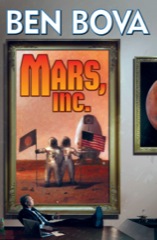
Mars, Inc.
How do you get to the Red Planet? Not via a benighted government program trapped in red tape and bound by budget constrictions, that’s for sure. No, what it will take is a helping of adventure, science, corporate powerplays, a generous dollop of seduction—both in and out of the boardroom—and money, money, money!Art Thrasher knows this. He is a man with a driving vision: send humans to Mars. The government has utterly failed, but Thrasher has got the plan to accomplish such a feat: form a “club” or billionaires to chip in one billion a year until the dream is accomplished. But these are men and women who are tough cookies, addicted to a profitable bottom-line, and disdainful of pie-in-the-sky dreamers who want to use their cash to make somebody else’s dreams come true.But Thrasher is different from the other dreamers in an important regard: he’s a billionaire himself, and the president of a successful company. But it’s going to take all his wiles as a captain of industry and master manipulator of business and capital to overcome setbacks and sabotage—and get a rocket full of scientist, engineers, visionaries, and dreamers on their way to the Red Planet.The man for the job has arrived. Art Thrasher is prepared to do whatever it takes to humans on Mars—or die trying!About Mars, Inc.:“. . .perfectly enjoyable as an SF book (could Bova write anything that wasn’t enjoyable?), Mars, Inc. has that torn-from-the-headline vibe that’s obviously intended for a larger audience. . . . the bottom line? Mars, Inc. has inspiration, excitement, thrills, romance, a dash of satir—and is a good, fun read . . . .”—Analog"The Hugo winner returns to his most popular subject: the quest for Mars."—Publishers Weekly Listen to the author discuss the book here on the Baen Free Radio Hour.

How do you get to the Red Planet? Not via a benighted government program trapped in red tape and bound by budget constrictions, that’s for sure. No, what it will take is a helping of adventure, science, corporate powerplays, a generous dollop of seduction—both in and out of the boardroom—and money, money, money!
Art Thrasher knows this. He is a man with a driving vision: send humans to Mars. The government has utterly failed, but Thrasher has got the plan to accomplish such a feat: form a “club” or billionaires to chip in one billion a year until the dream is accomplished. But these are men and women who are tough cookies, addicted to a profitable bottom-line, and disdainful of pie-in-the-sky dreamers who want to use their cash to make somebody else’s dreams come true.
But Thrasher is different from the other dreamers in an important regard: he’s a billionaire himself, and the president of a successful company. But it’s going to take all his wiles as a captain of industry and master manipulator of business and capital to overcome setbacks and sabotage—and get a rocket full of scientist, engineers, visionaries, and dreamers on their way to the Red Planet.
The man for the job has arrived. Art Thrasher is prepared to do whatever it takes to humans on Mars—or die trying!
About Mars, Inc.:
“. . .perfectly enjoyable as an SF book (could Bova write anything that wasn’t enjoyable?), Mars, Inc. has that torn-from-the-headline vibe that’s obviously intended for a larger audience. . . . the bottom line? Mars, Inc. has inspiration, excitement, thrills, romance, a dash of satir—and is a good, fun read . . . .”—Analog
"The Hugo winner returns to his most popular subject: the quest for Mars."—Publishers Weekly
Listen to the author discuss the book here on the Baen Free Radio Hour.


Select the format you would like to download:
Download Unzipped Files
EPUB/Kindle/Apple iOS/Nook Format
Download Zip Files
EPUB/Kindle/Apple iOS/Nook Format Zip
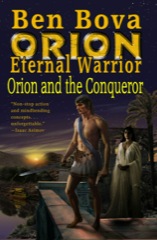
Orion and the Conqueror
The intrigues of fourth-century-B.C. Macedonia and Greece are brought vividly to life in this sweeping historical fantasy featuring Orion, the time-tossed eternal warrior. To avert the possibility that the strands of space-time might unravel, Orion, rebellious instrument of the Creators previously encountered in Orion in the Dying Time , is sent to the court of Philip II to ensure that his son Alexander succeeds in his territorial conquests. The sounds, the scents and the sensibility of the ancient world permeate this well-wrought adventure. Book 3 of the Orion: Eternal Warrior Series. Stunning SF from a six-time Hugo award winner.

The intrigues of fourth-century-B.C. Macedonia and Greece are brought vividly to life in this sweeping historical fantasy featuring Orion, the time-tossed eternal warrior. To avert the possibility that the strands of space-time might unravel, Orion, rebellious instrument of the Creators previously encountered in Orion in the Dying Time , is sent to the court of Philip II to ensure that his son Alexander succeeds in his territorial conquests. The sounds, the scents and the sensibility of the ancient world permeate this well-wrought adventure. Book 3 of the Orion: Eternal Warrior Series.
Stunning SF from a six-time Hugo award winner.


Select the format you would like to download:
Download Unzipped Files
EPUB/Kindle/Apple iOS/Nook Format
Download Zip Files
EPUB/Kindle/Apple iOS/Nook Format Zip
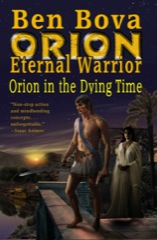
Orion in the Dying Time
At the end of the Cretaceous Period, Earth is in the grip of the dinosaurs. Their leader is the reptilian Set, worshipped by the Egyptians as a powerful god for thousands of years. His mission is to destroy the Creators--Orion's masters--and rule the planet. But one cantankerous eternal warrior is determined to stand in his way, and Orion has faced down powerful gods before, if none so deadly at Set. Book 1 of the Orion: Eternal Warrior Series. Stunning SF from a six-time Hugo award winner.

At the end of the Cretaceous Period, Earth is in the grip of the dinosaurs. Their leader is the reptilian Set, worshipped by the Egyptians as a powerful god for thousands of years. His mission is to destroy the Creators--Orion's masters--and rule the planet. But one cantankerous eternal warrior is determined to stand in his way, and Orion has faced down powerful gods before, if none so deadly at Set. Book 1 of the Orion: Eternal Warrior Series.
Stunning SF from a six-time Hugo award winner.


Select the format you would like to download:
Download Unzipped Files
EPUB/Kindle/Apple iOS/Nook Format
Download Zip Files
EPUB/Kindle/Apple iOS/Nook Format Zip
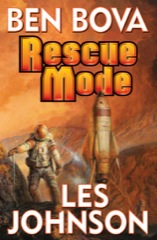
Rescue Mode
The first human mission to Mars meets with near‑disaster when a meteoroid strikes the spacecraft, almost destroying it. The ship is too far from Earth to simply turn around and return home. The eight‑person crew must ride their crippled ship to Mars while they desperately struggle to survive. On Earth, powerful political forces that oppose human spaceflight try to use the accident as proof that sending humans into space is too dangerous to continue. The whole human space flight program hangs in the balance. And if the astronauts can’t nurse their ship to Mars and back, the voyagers will become either the first Martian colonists—or the first humans to perish on another planet. Listen to the authors discuss the book here on the Baen Free Radio Hour.
The first human mission to Mars meets with near‑disaster when a meteoroid strikes the spacecraft, almost destroying it. The ship is too far from Earth to simply turn around and return home. The eight‑person crew must ride their crippled ship to Mars while they desperately struggle to survive.
On Earth, powerful political forces that oppose human spaceflight try to use the accident as proof that sending humans into space is too dangerous to continue. The whole human space flight program hangs in the balance. And if the astronauts can’t nurse their ship to Mars and back, the voyagers will become either the first Martian colonists—or the first humans to perish on another planet.
Listen to the authors discuss the book here on the Baen Free Radio Hour.

Select the format you would like to download:
Download Unzipped Files
EPUB/Kindle/Apple iOS/Nook Format
Download Zip Files
EPUB/Kindle/Apple iOS/Nook Format Zip
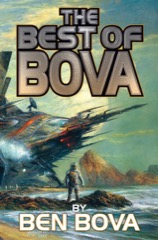
The Best of Bova
VOLUME 1 IN A STERLING COLLECTION OF STORIES FROM LEGENDARY HARD SCIENCE FICTION MASTER BEN BOVA. Selected stories from Bova's amazing career at the center of science fiction and space advocacy. He is the creator of the New York Times best-selling Grand Tour science fiction series, a six time Hugo award winner, and past president of the National Space Society. Volume #1 of 3 of the very best of Ben Bova, a grand master of science fiction storytelling. These stories span the five decades of Bova's incandescent career. Here are tales of star-faring adventure, peril, and drama. Here are journeys into the mind-bending landscapes of virtual worlds and alternate realities. Here you'll also find stories of humanity's astounding future on Earth, on Mars, and in the Solar System beyond—stories that always get the science right. And Bova's gathering of deeply realized, totally human characters are the heroic, brave, tricky, sometimes dastardly engineers, astronauts, corporate magnates, politicians, and scientists who will make these futures possible—and those who often find that the problems of tomorrow are always linked to human values, and human failings, that are as timeless as the stars.

VOLUME 1 IN A STERLING COLLECTION OF STORIES FROM LEGENDARY HARD SCIENCE FICTION MASTER BEN BOVA. Selected stories from Bova's amazing career at the center of science fiction and space advocacy. He is the creator of the New York Times best-selling Grand Tour science fiction series, a six time Hugo award winner, and past president of the National Space Society.
Volume #1 of 3 of the very best of Ben Bova, a grand master of science fiction storytelling. These stories span the five decades of Bova's incandescent career.
Here are tales of star-faring adventure, peril, and drama. Here are journeys into the mind-bending landscapes of virtual worlds and alternate realities. Here you'll also find stories of humanity's astounding future on Earth, on Mars, and in the Solar System beyond—stories that always get the science right. And Bova's gathering of deeply realized, totally human characters are the heroic, brave, tricky, sometimes dastardly engineers, astronauts, corporate magnates, politicians, and scientists who will make these futures possible—and those who often find that the problems of tomorrow are always linked to human values, and human failings, that are as timeless as the stars.


Select the format you would like to download:
Download Unzipped Files
EPUB/Kindle/Apple iOS/Nook Format
Download Zip Files
EPUB/Kindle/Apple iOS/Nook Format Zip
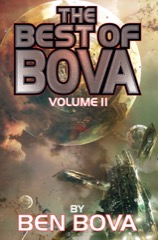
The Best of Bova, Volume II
VOLUME #2 IN A STERLING COLLECTION OF STORIES FROM LEGENDARY HARD SCIENCE FICTION MASTER BEN BOVA. Selected stories from Bova's amazing career at the center of science fiction and space advocacy. He is the creator of the New York Times best-selling Grand Tour science fiction series, a six time Hugo award winner, and past president of the National Space Society. Volume #2 of 3 of the very best of Ben Bova, a grandmaster of science fiction storytelling. These stories span the five decades of Bova's incandescent career. Here are tales of star-faring adventure, peril, and drama. Here are journeys into the mind-bending landscapes of virtual worlds and alternate realities. Here you'll also find stories of humanity's astounding future on Earth, on Mars and in the Solar System beyond—stories that always get the science right. And Bova's gathering of deeply realized, totally human characters are the heroic, brave, tricky, sometimes dastardly engineers, astronauts, corporate magnates, politicians, and scientists who will make these futures possible—and those who often find that the problems of tomorrow are always linked to human values, and human failings, that are as timeless as the stars.

VOLUME #2 IN A STERLING COLLECTION OF STORIES FROM LEGENDARY HARD SCIENCE FICTION MASTER BEN BOVA. Selected stories from Bova's amazing career at the center of science fiction and space advocacy. He is the creator of the New York Times best-selling Grand Tour science fiction series, a six time Hugo award winner, and past president of the National Space Society.
Volume #2 of 3 of the very best of Ben Bova, a grandmaster of science fiction storytelling. These stories span the five decades of Bova's incandescent career.
Here are tales of star-faring adventure, peril, and drama. Here are journeys into the mind-bending landscapes of virtual worlds and alternate realities. Here you'll also find stories of humanity's astounding future on Earth, on Mars and in the Solar System beyond—stories that always get the science right. And Bova's gathering of deeply realized, totally human characters are the heroic, brave, tricky, sometimes dastardly engineers, astronauts, corporate magnates, politicians, and scientists who will make these futures possible—and those who often find that the problems of tomorrow are always linked to human values, and human failings, that are as timeless as the stars.


Select the format you would like to download:
Download Unzipped Files
EPUB/Kindle/Apple iOS/Nook Format
Download Zip Files
EPUB/Kindle/Apple iOS/Nook Format Zip
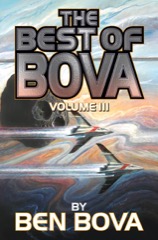
The Best of Bova, Volume III
Volume #3 of 3 of the very best of Ben Bova, a grandmaster of science fiction storytelling. These stories span the five decades of Bova's incandescent career. Here are tales of star-faring adventure, peril, and drama. Here are journeys into the mind-bending landscapes of virtual worlds and alternate realities. Here you'll also find stories of humanity's astounding future on Earth, on Mars and in the Solar System beyond—stories that always get the science right. And Bova's gathering of deeply realized, totally human characters are the heroic, brave, tricky, sometimes dastardly engineers, astronauts, corporate magnates, politicians, and scientists who will make these futures possible—and those who often find that the problems of tomorrow are always linked to human values, and human failings, that are as timeless as the stars.

Volume #3 of 3 of the very best of Ben Bova, a grandmaster of science fiction storytelling. These stories span the five decades of Bova's incandescent career.
Here are tales of star-faring adventure, peril, and drama. Here are journeys into the mind-bending landscapes of virtual worlds and alternate realities. Here you'll also find stories of humanity's astounding future on Earth, on Mars and in the Solar System beyond—stories that always get the science right. And Bova's gathering of deeply realized, totally human characters are the heroic, brave, tricky, sometimes dastardly engineers, astronauts, corporate magnates, politicians, and scientists who will make these futures possible—and those who often find that the problems of tomorrow are always linked to human values, and human failings, that are as timeless as the stars.


Select the format you would like to download:
Download Unzipped Files
EPUB/Kindle/Apple iOS/Nook Format
Download Zip Files
EPUB/Kindle/Apple iOS/Nook Format Zip
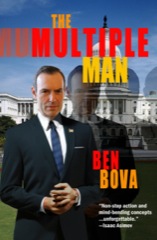
The Multiple Man
From acclaimed, Hugo award-winning, science fiction author, Ben Bova. The dynamic new President of the United States, James J. Halliday, seems determined to single-handedly turn an embittered nation around from economic, political, and social ruin. No one could be prouder than his devoted press secretary Meric Albano. But is the President accomplishing this monumental task alone? After one of the President's rare public appearances, a derelict is found dead nearby. A derelict who not only looks like the President, but whose blood, retinas, even fingerprints match those of the man in charge. Is the real President, the man Albano swore loyalty to, still in office? Is this part of a plot to topple American democracy? That's what Albano has to find out-if he doesn't, his life, as well as his country, will be destroyed. Stunning SF from a six-time Hugo award winner.

From acclaimed, Hugo award-winning, science fiction author, Ben Bova. The dynamic new President of the United States, James J. Halliday, seems determined to single-handedly turn an embittered nation around from economic, political, and social ruin. No one could be prouder than his devoted press secretary Meric Albano. But is the President accomplishing this monumental task alone? After one of the President's rare public appearances, a derelict is found dead nearby. A derelict who not only looks like the President, but whose blood, retinas, even fingerprints match those of the man in charge. Is the real President, the man Albano swore loyalty to, still in office? Is this part of a plot to topple American democracy? That's what Albano has to find out-if he doesn't, his life, as well as his country, will be destroyed.
Stunning SF from a six-time Hugo award winner.


Select the format you would like to download:
Download Unzipped Files
EPUB/Kindle/Apple iOS/Nook Format
Download Zip Files
EPUB/Kindle/Apple iOS/Nook Format Zip

The Winds of Altair
Earth is an old planet, and her teeming masses are running out of resources and time. It is up to men such as Jeff Holman to discover a haven for Earth’s millions. Altair VI is one such planet, and Holman is determined to transform this world into one where the human race can survive. Star probes had long before informed Earth that Altair VI had a flourishing ecology with one very tough beast at the top of the food chain, a beast that will have to be dealt with before the human colony ships arrive. The beast is not only tough, it is as smart as a man. Stunning SF from a six-time Hugo award winner.

Earth is an old planet, and her teeming masses are running out of resources and time. It is up to men such as Jeff Holman to discover a haven for Earth’s millions. Altair VI is one such planet, and Holman is determined to transform this world into one where the human race can survive. Star probes had long before informed Earth that Altair VI had a flourishing ecology with one very tough beast at the top of the food chain, a beast that will have to be dealt with before the human colony ships arrive. The beast is not only tough, it is as smart as a man.
Stunning SF from a six-time Hugo award winner.


Select the format you would like to download:
Download Unzipped Files
EPUB/Kindle/Apple iOS/Nook Format
Download Zip Files
EPUB/Kindle/Apple iOS/Nook Format Zip
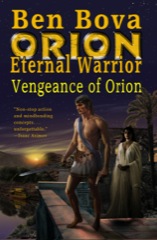
Vengeance of Orion
Orion, the time-tossed eternal warrior, finds himself thrust back to the ancient world of Greece and must prevent the Greek army from destroying the citadel of Troy. If he fails, he will lose the only woman he has ever loved. But if he succeeds, the history of the world will be changed forever. Book 2 of the Orion: Eternal Warrior Series. Stunning SF from a six-time Hugo award winner.

Orion, the time-tossed eternal warrior, finds himself thrust back to the ancient world of Greece and must prevent the Greek army from destroying the citadel of Troy. If he fails, he will lose the only woman he has ever loved. But if he succeeds, the history of the world will be changed forever. Book 2 of the Orion: Eternal Warrior Series.
Stunning SF from a six-time Hugo award winner.


Select the format you would like to download:
Download Unzipped Files
EPUB/Kindle/Apple iOS/Nook Format
Download Zip Files
EPUB/Kindle/Apple iOS/Nook Format Zip
More books by undefined (23)
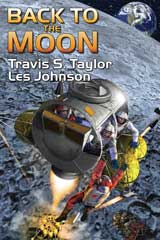
Back to the Moon
THE SECOND TIME AROUND—IS HARDER . . . Decades after the last footprints were left on the Moon, the U.S. was preparing to return to the Lunar surface in a new class of rockets, when the mission suddenly became much more urgent. It would have to be a rescue mission. Unbeknownst to the rest of the world China had sent its own Lunar expedition. A manned expedition. Until a distress call was received, no human outside of China even knew that the mission was manned—or that their ship had crash-landed and couldn’t take off again. Time was running out, and if the four Chinese astronauts were to be rescued, the American lunar mission would have to launch immediately, with only a skeleton crew. Once the heroic U.S. astronauts were underway the army of engineers and scientists back home had the daunting task of deciding what equipment could be left on the Moon to permit the Lunar lander vehicle vehicle to lift safely from the Moon with the two U.S. astronauts and the four stranded Chinese taikonauts! Could the U.S. mount such a mission successfully—and would thousands of years of instilled honor “allow” the Chinese astronauts to accept a rescue? ABOUT THE AUTHORS Travis S. Taylor—“Doc” Taylor to his friends—has earned his soubriquet the hard way: He has a doctorate in optical science and engineering, a master's degree in physics, a master's degree in aerospace engineering, a master's degree in astronomy, and a bachelor's degree in electrical engineering. Dr. Taylor has worked on various programs for the Department of Defense and NASA for the past sixteen years. He's currently working on several advanced propulsion concepts, very large space telescopes, space-based beamed energy systems, and next generation space launch concepts. He has appeared in several episodes of the History Channel’s Universe series. He lives in Auburn, AL with his wife Karen and their daughter. Les Johnson is a NASA physicist, manager, author, husband and father. By day, he serves as the Deputy Manager for the Advanced Concepts Office at the NASA George C. Marshall Space Flight Center in Huntsville, Alabama, one of the coolest jobs in the universe. In the early 2000s, he was NASA’s Manager for Interstellar Propulsion Research and later managed the In-Space Propulsion Technology Project. He was technical consultant for the movie Lost in Space and has appeared on the Discovery Channel series, “Physics of the Impossible” in the “How to Build a Starship” episode. He has also appeared in three episodes of the Science Channel series, Exodus Earth. In his spare time he writes popular science books and articles, including Solar Sails: A Novel approach to Interplanetary Travel, Living Off the Land in Space: Green Roads to the Cosmos and Paradise Regained: The Regreening of Earth. Listen to the authors discuss the book here on the Baen Free Radio Hour.
THE SECOND TIME AROUND—IS HARDER . . .
Decades after the last footprints were left on the Moon, the U.S. was preparing to return to the Lunar surface in a new class of rockets, when the mission suddenly became much more urgent. It would have to be a rescue mission.
Unbeknownst to the rest of the world China had sent its own Lunar expedition. A manned expedition. Until a distress call was received, no human outside of China even knew that the mission was manned—or that their ship had crash-landed and couldn’t take off again.
Time was running out, and if the four Chinese astronauts were to be rescued, the American lunar mission would have to launch immediately, with only a skeleton crew. Once the heroic U.S. astronauts were underway the army of engineers and scientists back home had the daunting task of deciding what equipment could be left on the Moon to permit the Lunar lander vehicle vehicle to lift safely from the Moon with the two U.S. astronauts and the four stranded Chinese taikonauts! Could the U.S. mount such a mission successfully—and would thousands of years of instilled honor “allow” the Chinese astronauts to accept a rescue?
ABOUT THE AUTHORS
Travis S. Taylor—“Doc” Taylor to his friends—has earned his soubriquet the hard way: He has a doctorate in optical science and engineering, a master's degree in physics, a master's degree in aerospace engineering, a master's degree in astronomy, and a bachelor's degree in electrical engineering. Dr. Taylor has worked on various programs for the Department of Defense and NASA for the past sixteen years. He's currently working on several advanced propulsion concepts, very large space telescopes, space-based beamed energy systems, and next generation space launch concepts. He has appeared in several episodes of the History Channel’s Universe series. He lives in Auburn, AL with his wife Karen and their daughter.
Les Johnson is a NASA physicist, manager, author, husband and father. By day, he serves as the Deputy Manager for the Advanced Concepts Office at the NASA George C. Marshall Space Flight Center in Huntsville, Alabama, one of the coolest jobs in the universe. In the early 2000s, he was NASA’s Manager for Interstellar Propulsion Research and later managed the In-Space Propulsion Technology Project. He was technical consultant for the movie Lost in Space and has appeared on the Discovery Channel series, “Physics of the Impossible” in the “How to Build a Starship” episode. He has also appeared in three episodes of the Science Channel series, Exodus Earth. In his spare time he writes popular science books and articles, including Solar Sails: A Novel approach to Interplanetary Travel, Living Off the Land in Space: Green Roads to the Cosmos and Paradise Regained: The Regreening of Earth.
Listen to the authors discuss the book here on the Baen Free Radio Hour.

Select the format you would like to download:
Download Unzipped Files
EPUB/Kindle/Apple iOS/Nook Format
Download Zip Files
EPUB/Kindle/Apple iOS/Nook Format Zip

Crisis at Proxima
Time is running out for the inhabitants of Proxima Centauri. Unsettling discoveries there and at Luyten’s star now threaten both Proxima and Earth, in a new hard science fiction thriller from Travis S. Taylor and Les Johnson.First contact with the seemingly impossible human civilization at Proxima Centauri is not going well. The Earth ships sent to render aid have not been able to reverse the contagion ravaging their population and, worse, many Proximans are now wondering if the humans from Earth are there for other, not so charitable, reasons. Can the extinction-level disaster faced at Proxima be reversed by the combined ingenuity of scientists from both worlds working together?Unsettling discoveries in the Proxima Centauri planetary system beg the questions: What if the evil gods depicted in Proxima’s ancient mythologies were real and far more powerful than even the humans from Earth with their late 21st century technologies? Worse, what if their ancient oppressors never truly left?
Time is running out for the inhabitants of Proxima Centauri. Unsettling discoveries there and at Luyten’s star now threaten both Proxima and Earth, in a new hard science fiction thriller from Travis S. Taylor and Les Johnson.
First contact with the seemingly impossible human civilization at Proxima Centauri is not going well. The Earth ships sent to render aid have not been able to reverse the contagion ravaging their population and, worse, many Proximans are now wondering if the humans from Earth are there for other, not so charitable, reasons. Can the extinction-level disaster faced at Proxima be reversed by the combined ingenuity of scientists from both worlds working together?
Unsettling discoveries in the Proxima Centauri planetary system beg the questions: What if the evil gods depicted in Proxima’s ancient mythologies were real and far more powerful than even the humans from Earth with their late 21st century technologies? Worse, what if their ancient oppressors never truly left?

Select the format you would like to download:
Download Unzipped Files
EPUB/Kindle/Apple iOS/Nook Format
Download Zip Files
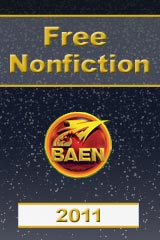
FREE
Free Nonfiction 2011
In February of 2011 we started posting free nonfiction we at Baen thought might be of interest to our readers. The first article was "The Size of it All" by Les Johnson, a Baen author and space scientist. As new nonfiction is made available, it will be posted on the main page, then added to this book (to save the Baen Barflies the trouble of doing it themselves). As is usual with such copyrighted material from Baen, the contents may be copied and shared but NOT sold. All commercial rights are reserved to Baen Books. The Size of it All by Les Johnson Terraforming Ganymede with Robert A. Heinlein - Part 1 by Gregory Benford The Amazon's Right Breast by Tom Kratman Brains Aflame: Out on the Frontier of Neuroscience with a World-Class Researcher by Tony Daniel Terraforming Ganymede with Robert A. Heinlein - Part 2 by Gregory Benford The Aliens are Not Among Us by Les Johnson Gravity's Punch by Tony Daniel Science and Society in the Citizen Series by John Lambshead Beating Decline: Miltech and the Survival of the U.S. by J.R. Dunn BEATING DECLINE: Miltech and the Survival of the U.S. by J.R. Dunn It's Lonely Out There – The Evolutionary Explanation for the Fermi Paradox John Lambshead
FREE
In February of 2011 we started posting free nonfiction we at Baen thought might be of interest to our readers. The first article was "The Size of it All" by Les Johnson, a Baen author and space scientist. As new nonfiction is made available, it will be posted on the main page, then added to this book (to save the Baen Barflies the trouble of doing it themselves).
As is usual with such copyrighted material from Baen, the contents may be copied and shared but NOT sold. All commercial rights are reserved to Baen Books.
The Size of it Allby Les Johnson Terraforming Ganymede with Robert A. Heinlein - Part 1
by Gregory Benford The Amazon's Right Breast
by Tom Kratman Brains Aflame: Out on the Frontier of Neuroscience with a World-Class Researcher
by Tony Daniel Terraforming Ganymede with Robert A. Heinlein - Part 2
by Gregory Benford The Aliens are Not Among Us
by Les Johnson Gravity's Punch
by Tony Daniel Science and Society in the Citizen Series
by John Lambshead Beating Decline: Miltech and the Survival of the U.S.
by J.R. Dunn BEATING DECLINE: Miltech and the Survival of the U.S.
by J.R. Dunn It's Lonely Out There – The Evolutionary Explanation for the Fermi Paradox
John Lambshead

Select the format you would like to download:
Download Unzipped Files
EPUB/Kindle/Apple iOS/Nook Format
Download Zip Files
EPUB/Kindle/Apple iOS/Nook Format Zip
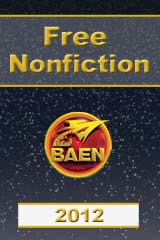
FREE
Free Nonfiction 2012
The Drugs of War by J.R. Dunn Putting the Science in Science Fiction by Tedd Roberts The Roads to the RCN Series by David Drake The Menace from Lydia: The Social Spider as Alien Invader by Robert E. Furey Rediscovering the Solar System by Les Johnson The Conquest of Planet Baen by Bob Kruger Indirectly Mistaken Decision Cycles by Tom Kratman Do Tanks Have a Future? by J.R. Dunn Getting Guns Right by Michael Z. Williamson Rediscovering the Universe by Les Johnson The Neuroscience of Darkships by Tedd Roberts Stars That Wander, Are You Bright: Are Stars Conscious? by Dr. Greg Matloff
FREE
The Drugs of War
by J.R. Dunn
Putting the Science in Science Fiction
by Tedd Roberts
The Roads to the RCN Series
by David Drake
The Menace from Lydia: The Social Spider as Alien Invader
by Robert E. Furey
Rediscovering the Solar System
by Les Johnson
The Conquest of Planet Baen
by Bob Kruger
Indirectly Mistaken Decision Cycles
by Tom Kratman
Do Tanks Have a Future?
by J.R. Dunn
Getting Guns Right
by Michael Z. Williamson
Rediscovering the Universe
by Les Johnson
The Neuroscience of Darkships
by Tedd Roberts
Stars That Wander, Are You Bright: Are Stars Conscious?
by Dr. Greg Matloff

Select the format you would like to download:
Download Unzipped Files
EPUB/Kindle/Apple iOS/Nook Format
Download Zip Files
EPUB/Kindle/Apple iOS/Nook Format Zip
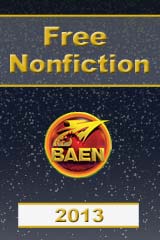
FREE
Free Nonfiction 2013
Listen to Terry Burlison discuss his essay, "Columbia's First Victims", here on the Baen Free Radio Hour. Family Therapy: Learning to Love Mercury and Pluto by William Ledbetter On the Road to the Brainships: A Look at the Current Science of Interfacing the Brain by Tedd Roberts The Closest Extra-solar Planet to Earth: What's Alpha Centauri Bb Like and How Can We Get There? by Les Johnson Siberian Dawn: Tapping Solar System Resources by Dr. Greg Matloff Evidence of Things Unseen: Why Not dark matter? by Les Johnson R.I.P., MOC by Terry Burlison Fracking and the American Comeback by J.R. Dunn A Terrible Thing to Lose: Zombie Science and Science Fiction in John Ringo's Under a Graveyard Sky by Tedd Roberts Columbia's First Victims by Terry Burlison Training for War, Part One by Tom Kratman Becoming Martian by Terry Burlison Training for War, Part Two by Tom Kratman Exoplanet Hunters by William Ledbetter Training for War, Part Three by Tom Kratman
FREE
Listen to Terry Burlison discuss his essay, "Columbia's First Victims", here on the Baen Free Radio Hour.
Family Therapy: Learning to Love Mercury and Plutoby William Ledbetter On the Road to the Brainships: A Look at the Current Science of Interfacing the Brain
by Tedd Roberts The Closest Extra-solar Planet to Earth: What's Alpha Centauri Bb Like and How Can We Get There?
by Les Johnson Siberian Dawn: Tapping Solar System Resources
by Dr. Greg Matloff Evidence of Things Unseen: Why Not dark matter?
by Les Johnson R.I.P., MOC
by Terry Burlison Fracking and the American Comeback
by J.R. Dunn A Terrible Thing to Lose: Zombie Science and Science Fiction in John Ringo's Under a Graveyard Sky
by Tedd Roberts Columbia's First Victims
by Terry Burlison Training for War, Part One
by Tom Kratman Becoming Martian
by Terry Burlison Training for War, Part Two
by Tom Kratman Exoplanet Hunters
by William Ledbetter Training for War, Part Three
by Tom Kratman

Select the format you would like to download:
Download Unzipped Files
EPUB/Kindle/Apple iOS/Nook Format
Download Zip Files
EPUB/Kindle/Apple iOS/Nook Format Zip
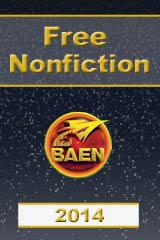
FREE
Free Nonfiction 2014
Listen to Bob Kruger discuss his essay, "Dungeons and Dragons: The 40 Year Quest for a Game that Breaks All the Rules," on the Baen Free Radio Hour: Part 1 | Part 2. From Smart Flesh to Custom Organs: The Growing Science of Tissue Engineering by Tedd Roberts Training for War, Part IV by Tom Kratman Dungeons and Dragons: The 40 Year Quest for a Game that Breaks All the Rules by Bob Kruger Training for War, Part V by Tom Kratman Rendezvous and Docking: A User's Guide for Non Rocket Scientists (Part 1) by Terry Burlison Rendezvous and Docking: A User's Guide for Non Rocket Scientists (Part 2) by Terry Burlison Training for War, Part VI by Tom Kratman Bloodied by Starlight by Jonathan LaForce Why Science is Never Settled - Part One by Tedd Roberts Why Science is Never Settled - Part Two by Tedd Roberts Even Fantasy Needs a Little Science (Even Magic Needs Rules)by Tedd Roberts Living without Satellites by Les Johnson Behind the Scenes at Mission Control by Terry Burlison Using Outer Space to Improve Life on Earth by Les Johnson A Medieval Artist In The 21st Century by Randy Asplund
FREE
Listen to Bob Kruger discuss his essay, "Dungeons and Dragons: The 40 Year Quest for a Game that Breaks All the Rules," on the Baen Free Radio Hour: Part 1 | Part 2.
From Smart Flesh to Custom Organs: The Growing Science of Tissue Engineeringby Tedd Roberts Training for War, Part IV
by Tom Kratman Dungeons and Dragons: The 40 Year Quest for a Game that Breaks All the Rules
by Bob Kruger Training for War, Part V
by Tom Kratman Rendezvous and Docking: A User's Guide for Non Rocket Scientists (Part 1)
by Terry Burlison Rendezvous and Docking: A User's Guide for Non Rocket Scientists (Part 2)
by Terry Burlison Training for War, Part VI
by Tom Kratman Bloodied by Starlight
by Jonathan LaForce Why Science is Never Settled - Part One
by Tedd Roberts Why Science is Never Settled - Part Two
by Tedd Roberts Even Fantasy Needs a Little Science (Even Magic Needs Rules)
by Tedd Roberts Living without Satellites
by Les Johnson Behind the Scenes at Mission Control
by Terry Burlison Using Outer Space to Improve Life on Earth
by Les Johnson A Medieval Artist In The 21st Century
by Randy Asplund

Select the format you would like to download:
Download Unzipped Files
EPUB/Kindle/Apple iOS/Nook Format
Download Zip Files
EPUB/Kindle/Apple iOS/Nook Format Zip
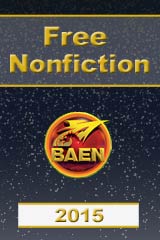
FREE
Free Nonfiction 2015
In February of 2011 we started posting free nonfiction we at Baen thought might be of interest to our readers. The first article was "The Size of it All" by Les Johnson, a Baen author and space scientist. As new nonfiction is made available, it will be posted on the main page, then added to this book (to save the Baen Barflies the trouble of doing it themselves). This is our compilation of nonfiction for 2015. As is usual with such copyrighted material from Baen, the contents may be copied and shared but NOT sold. All commercial rights are reserved to Baen Books. Our Worldship Broke! by Jim Beall A Translunar Laboratory . . . Hurrah! by Tedd Roberts The Incredibly Small Exploring the Cosmically Huge: Nanotechnology to Enable Future Space Probes by Joseph E. Meany The Distant Past: A Setting for Science Fiction by Michael Z. Williamson Using Missile Defense Against Terrorist Attack Israel’s Iron Dome and the Future of Rocket Shields by Alan Isom Remember to Remind Me. . . The Changing Science of Memory by Tedd Roberts Slaughtering Early Humans for Fun and (a Slight) Profit by Dave Drake Space Tethers and Elevators by Les Johnson Case Studies in Handwavium by Jim Beall Tomorrow's Math by Robert Dawson Will Hollywood Ever Get It Right? by Tedd Roberts The CubeSat Revolution by Les Johnson
FREE
In February of 2011 we started posting free nonfiction we at Baen thought might be of interest to our readers. The first article was "The Size of it All" by Les Johnson, a Baen author and space scientist. As new nonfiction is made available, it will be posted on the main page, then added to this book (to save the Baen Barflies the trouble of doing it themselves). This is our compilation of nonfiction for 2015.
As is usual with such copyrighted material from Baen, the contents may be copied and shared but NOT sold. All commercial rights are reserved to Baen Books.
Our Worldship Broke!by Jim Beall A Translunar Laboratory . . . Hurrah!
by Tedd Roberts The Incredibly Small Exploring the Cosmically Huge: Nanotechnology to Enable Future Space Probes
by Joseph E. Meany The Distant Past: A Setting for Science Fiction
by Michael Z. Williamson Using Missile Defense Against Terrorist Attack Israel’s Iron Dome and the Future of Rocket Shields
by Alan Isom Remember to Remind Me. . . The Changing Science of Memory
by Tedd Roberts Slaughtering Early Humans for Fun and (a Slight) Profit
by Dave Drake Space Tethers and Elevators
by Les Johnson Case Studies in Handwavium
by Jim Beall Tomorrow's Math
by Robert Dawson Will Hollywood Ever Get It Right?
by Tedd Roberts The CubeSat Revolution
by Les Johnson

Select the format you would like to download:
Download Unzipped Files
EPUB/Kindle/Apple iOS/Nook Format
Download Zip Files
EPUB/Kindle/Apple iOS/Nook Format Zip

FREE
Free Nonfiction 2016
In February of 2011 we started posting free nonfiction we at Baen thought might be of interest to our readers. The first article was "The Size of it All" by Les Johnson, a Baen author and space scientist. As new nonfiction is made available, it will be posted on the main page, then added to this book (to save the Baen Barflies the trouble of doing it themselves). This is our compilation of nonfiction for 2016. As is usual with such copyrighted material from Baen, the contents may be copied and shared but NOT sold. All commercial rights are reserved to Baen Books. From Corvus to Keyhole Shipyards—Past, Present, and Science Fiction by Jim Beall Are We Really Just Wired Differently? by Tedd Roberts The Near Future of Human Genome Engineering by Dan Koboldt Mars, Moon or Bust! by Les Johnson Do Dungeon Masters Roll Magic Dice? Willful Self-Deception on the Campaign Trail by Bob Kruger Strange Sex: Alien Reproduction Through a Biologist’s Eyes—and What This Could Mean to Science Fiction by Dave Freer The Science of Dr. Gribbleflotz by Rick Boatright A Quantum of Consciousness by John Lambshead Radium Girls of Science and Science Fiction by Jim Beall Dark Matter of the Human Genome by Dan Kobolt Of Dragons and Valkyries: Helicopters in Fiction by Kacey Ezell Homo Stellaris: Becoming the People of the Stars by Robert E. Hampson, Ph.D.
FREE
In February of 2011 we started posting free nonfiction we at Baen thought might be of interest to our readers. The first article was "The Size of it All" by Les Johnson, a Baen author and space scientist. As new nonfiction is made available, it will be posted on the main page, then added to this book (to save the Baen Barflies the trouble of doing it themselves). This is our compilation of nonfiction for 2016.
As is usual with such copyrighted material from Baen, the contents may be copied and shared but NOT sold. All commercial rights are reserved to Baen Books.
From Corvus to Keyhole Shipyards—Past, Present, and Science Fictionby Jim Beall Are We Really Just Wired Differently?
by Tedd Roberts The Near Future of Human Genome Engineering
by Dan Koboldt Mars, Moon or Bust!
by Les Johnson Do Dungeon Masters Roll Magic Dice? Willful Self-Deception on the Campaign Trail
by Bob Kruger Strange Sex: Alien Reproduction Through a Biologist’s Eyes—and What This Could Mean to Science Fiction
by Dave Freer The Science of Dr. Gribbleflotz
by Rick Boatright A Quantum of Consciousness
by John Lambshead Radium Girls of Science and Science Fiction
by Jim Beall Dark Matter of the Human Genome
by Dan Kobolt Of Dragons and Valkyries: Helicopters in Fiction
by Kacey Ezell Homo Stellaris: Becoming the People of the Stars
by Robert E. Hampson, Ph.D.

Select the format you would like to download:
Download Unzipped Files
EPUB/Kindle/Apple iOS/Nook Format
Download Zip Files
EPUB/Kindle/Apple iOS/Nook Format Zip
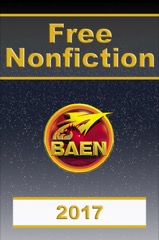
FREE
Free Nonfiction 2017
In February of 2011 we started posting free nonfiction we at Baen thought might be of interest to our readers. The first article was "The Size of it All" by Les Johnson, a Baen author and space scientist. As new nonfiction is made available, it will be posted on the main page, then added to this book (to save the Baen Barflies the trouble of doing it themselves). This is our compilation of nonfiction for 2017. As is usual with such copyrighted material from Baen, the contents may be copied and shared but NOT sold. All commercial rights are reserved to Baen Books. The Truly HARD Science in Kill Before Dying—and the Rest of the Tau Ceti Universeby Dr. Travis S. Taylor The Galactic Internet (And We're Still Using Dial-up)by Les Johnson Honorverse Analytics: Why Manticore Won the Warby Pat Doyle and Chris Weuve Chimeras: Science and Science Fictionby Dan Koboldt Robert E. Lee and Decisive Battle: How Lee's Strategic Thinking is Portrayed in The Day After Gettysburgby J.R. Dunn Bug-Eyed Monsters Versus the World Buildersby William Ledbetter Stasis: The Future of Suspended Animationby Philip A. Kramer Graphene—Not Just Another Miracle Materialby Les Johnson and Joseph Meany Seeing Inside Your Head: From MRI to Telepathy?by Robert E. Hampson, Ph.D. Right Hand, Human Brain: The Mysteries of Handednessby Benjamin C. Kinney Grid Warsby Jim Beall Nuclear Fission Power in SpaceAndy Presby
FREE
In February of 2011 we started posting free nonfiction we at Baen thought might be of interest to our readers. The first article was "The Size of it All" by Les Johnson, a Baen author and space scientist. As new nonfiction is made available, it will be posted on the main page, then added to this book (to save the Baen Barflies the trouble of doing it themselves). This is our compilation of nonfiction for 2017.
As is usual with such copyrighted material from Baen, the contents may be copied and shared but NOT sold. All commercial rights are reserved to Baen Books.
The Truly HARD Science in Kill Before Dying—and the Rest of the Tau Ceti Universeby Dr. Travis S. Taylor The Galactic Internet (And We're Still Using Dial-up)
by Les Johnson Honorverse Analytics: Why Manticore Won the War
by Pat Doyle and Chris Weuve Chimeras: Science and Science Fiction
by Dan Koboldt Robert E. Lee and Decisive Battle: How Lee's Strategic Thinking is Portrayed in The Day After Gettysburg
by J.R. Dunn Bug-Eyed Monsters Versus the World Builders
by William Ledbetter Stasis: The Future of Suspended Animation
by Philip A. Kramer Graphene—Not Just Another Miracle Material
by Les Johnson and Joseph Meany Seeing Inside Your Head: From MRI to Telepathy?
by Robert E. Hampson, Ph.D. Right Hand, Human Brain: The Mysteries of Handedness
by Benjamin C. Kinney Grid Wars
by Jim Beall Nuclear Fission Power in Space
Andy Presby

Select the format you would like to download:
Download Unzipped Files
EPUB/Kindle/Apple iOS/Nook Format
Download Zip Files
EPUB/Kindle/Apple iOS/Nook Format Zip
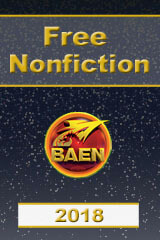
FREE
Free Nonfiction 2018
In February of 2011 we started posting free nonfiction we at Baen thought might be of interest to our readers. The first article was "The Size of it All" by Les Johnson, a Baen author and space scientist. As new nonfiction is made available, it will be posted on the main page, then added to this book (to save the Baen Barflies the trouble of doing it themselves). This is our compilation of nonfiction for 2018. As is usual with such copyrighted material from Baen, the contents may be copied and shared but NOT sold. All commercial rights are reserved to Baen Books. Catching the Gravitational Lens Expressby Les Johnson Every Seven Minutesby Dr. Robert E. Hampson Magic Systems Aren't Magicby D.J. Butler Fixing Broken Memoryby Dr. Robert E. Hampson Character of the Female Warrior: an FAQby Kacey Ezell and Jennifer Whetstone Life Beyond Earth? Look to Small Stars by Kerry Hensley Conflict in the South China Seaby J.R. Dunn Why FTL Will End the Universe—and Six Ways to Avoid It in an SF Storyby John Lambshead Atomic Folliesby Jim Beall Principles of Organization for War and Organizing for War in the Carreraverse, Part Oneby Thomas P. Kratman Principles of Organization for War and Organizing for War in the Carreraverse, Part Twoby Tom Kratman Principles of Organization for War and Organizing for War in the Carreraverse, Part Three: The Rest of the Organization Principles Explainedby Tom Kratman
FREE
In February of 2011 we started posting free nonfiction we at Baen thought might be of interest to our readers. The first article was "The Size of it All" by Les Johnson, a Baen author and space scientist. As new nonfiction is made available, it will be posted on the main page, then added to this book (to save the Baen Barflies the trouble of doing it themselves). This is our compilation of nonfiction for 2018.
As is usual with such copyrighted material from Baen, the contents may be copied and shared but NOT sold. All commercial rights are reserved to Baen Books.
Catching the Gravitational Lens Expressby Les Johnson Every Seven Minutes
by Dr. Robert E. Hampson Magic Systems Aren't Magic
by D.J. Butler Fixing Broken Memory
by Dr. Robert E. Hampson Character of the Female Warrior: an FAQ
by Kacey Ezell and Jennifer Whetstone Life Beyond Earth? Look to Small Stars
by Kerry Hensley Conflict in the South China Sea
by J.R. Dunn Why FTL Will End the Universe—and Six Ways to Avoid It in an SF Story
by John Lambshead Atomic Follies
by Jim Beall Principles of Organization for War and Organizing for War in the Carreraverse, Part One
by Thomas P. Kratman Principles of Organization for War and Organizing for War in the Carreraverse, Part Two
by Tom Kratman Principles of Organization for War and Organizing for War in the Carreraverse, Part Three: The Rest of the Organization Principles Explained
by Tom Kratman

Select the format you would like to download:
Download Unzipped Files
EPUB/Kindle/Apple iOS/Nook Format
Download Zip Files
EPUB/Kindle/Apple iOS/Nook Format Zip
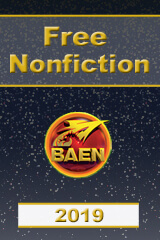
FREE
Free Nonfiction 2019
In February of 2011 we started posting free nonfiction we at Baen thought might be of interest to our readers. The first article was "The Size of it All" by Les Johnson, a Baen author and space scientist. As new nonfiction is made available, it will be posted on the main page, then added to this book (to save the Baen Barflies the trouble of doing it themselves). This is our compilation of nonfiction for 2019. As is usual with such copyrighted material from Baen, the contents may be copied and shared but NOT sold. All commercial rights are reserved to Baen Books. Swords of Lok: A Historical Approach to the Edged Weapons of Larry Correia's High Fantasy World by Whit Williams Principles of Organization for War and Organizing for War in the Carreraverse: Part Four: Military Organization of Carrera's Legions by Tom Kratman Genetics Advice for Generation Starships by Dan Koboldt The Evolution of Body Armor by Michael Z. Williamson Warships of Sea and Space: Form Follows Function Follows Technology by Jim Beall Warships of Sea and Space: Form Follows Function Follows Technology, Part II by Jim Beall Do You Believe in the Singularity? by Dr. Robert E. Hampson As Big as Space Itself: Building Our Own Space Megastructures—and Searching for Them as Galactic Signatures of Alien Civilizations by Les Johnson The Universe Beyond the Plasma Frequency by Kerry Hensley Man Caves: Humanity's Next Home by Ken Roy
FREE
In February of 2011 we started posting free nonfiction we at Baen thought might be of interest to our readers. The first article was "The Size of it All" by Les Johnson, a Baen author and space scientist. As new nonfiction is made available, it will be posted on the main page, then added to this book (to save the Baen Barflies the trouble of doing it themselves). This is our compilation of nonfiction for 2019.
As is usual with such copyrighted material from Baen, the contents may be copied and shared but NOT sold. All commercial rights are reserved to Baen Books.
Swords of Lok: A Historical Approach to the Edged Weapons of Larry Correia's High Fantasy World by Whit Williams
Principles of Organization for War and Organizing for War in the Carreraverse: Part Four: Military Organization of Carrera's Legions by Tom Kratman
Genetics Advice for Generation Starships by Dan Koboldt
The Evolution of Body Armor by Michael Z. Williamson
Warships of Sea and Space: Form Follows Function Follows Technology by Jim Beall
Warships of Sea and Space: Form Follows Function Follows Technology, Part II by Jim Beall
Do You Believe in the Singularity? by Dr. Robert E. Hampson
As Big as Space Itself: Building Our Own Space Megastructures—and Searching for Them as Galactic Signatures of Alien Civilizations by Les Johnson
The Universe Beyond the Plasma Frequency by Kerry Hensley
Man Caves: Humanity's Next Home by Ken Roy

Select the format you would like to download:
Download Unzipped Files
EPUB/Kindle/Apple iOS/Nook Format
Download Zip Files
EPUB/Kindle/Apple iOS/Nook Format Zip
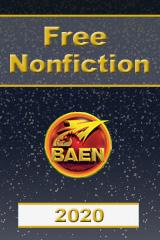
FREE
Free Nonfiction 2020
In February of 2011 we started posting free nonfiction we at Baen thought might be of interest to our readers. The first article was "The Size of it All" by Les Johnson, a Baen author and space scientist. As new nonfiction is made available, it will be posted on the main page, then added to this book (to save the Baen Barflies the trouble of doing it themselves). This is our compilation of nonfiction for 2020. As is usual with such copyrighted material from Baen, the contents may be copied and shared but NOT sold. All commercial rights are reserved to Baen Books. Beamed Energy for Space Exploration: Giant Leap or Incremental Steps? by Les Johnson The Bridge of Sighs: Are We What Might Have Been? by Robert E. Furey Notes on the Carreraverse (A Concordance, More or Less), Part 1 by Tom Kratman Space Pirates! by Mark Lardas Notes on the Carreraverse (A Concordance, More or Less), Part 2 by Tom Kratman
FREE
In February of 2011 we started posting free nonfiction we at Baen thought might be of interest to our readers. The first article was "The Size of it All" by Les Johnson, a Baen author and space scientist. As new nonfiction is made available, it will be posted on the main page, then added to this book (to save the Baen Barflies the trouble of doing it themselves). This is our compilation of nonfiction for 2020.
As is usual with such copyrighted material from Baen, the contents may be copied and shared but NOT sold. All commercial rights are reserved to Baen Books.
Beamed Energy for Space Exploration: Giant Leap or Incremental Steps? by Les Johnson
The Bridge of Sighs: Are We What Might Have Been? by Robert E. Furey
Notes on the Carreraverse (A Concordance, More or Less), Part 1 by Tom Kratman
Notes on the Carreraverse (A Concordance, More or Less), Part 2 by Tom Kratman

Select the format you would like to download:
Download Unzipped Files
EPUB/Kindle/Apple iOS/Nook Format
Download Zip Files
EPUB/Kindle/Apple iOS/Nook Format Zip
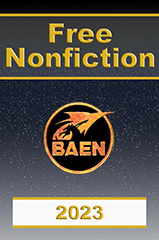
FREE
Free Nonfiction 2023
In February of 2011 we started posting free nonfiction we at Baen thought might be of interest to our readers. The first article was "The Size of it All" by Les Johnson, a Baen author and space scientist. As new nonfiction is made available, it will be posted on the main page, then added to this book (to save the Baen Barflies the trouble of doing it themselves). This is our compilation of nonfiction for 2023. As is usual with such copyrighted material from Baen, the contents may be copied and shared but NOT sold. All commercial rights are reserved to Baen Books.
FREE
In February of 2011 we started posting free nonfiction we at Baen thought might be of interest to our readers. The first article was "The Size of it All" by Les Johnson, a Baen author and space scientist. As new nonfiction is made available, it will be posted on the main page, then added to this book (to save the Baen Barflies the trouble of doing it themselves). This is our compilation of nonfiction for 2023.
As is usual with such copyrighted material from Baen, the contents may be copied and shared but NOT sold. All commercial rights are reserved to Baen Books.

Select the format you would like to download:
Download Unzipped Files
EPUB/Kindle/Apple iOS/Nook Format
Download Zip Files
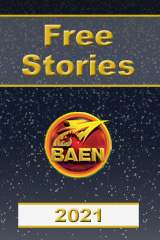
FREE
Free Stories 2021
In January of 2011 we started posting free short stories we thought might be of interest to Baen readers. The first stories were "Space Hero" by Patrick Lundrigan, the winner of the 2010 Jim Baen Memorial Short Story Contest, and "Tanya, Princess of Elves," by Larry Correia, author of Monster Hunter International and set in that universe. As new stories are made available, they will be posted on the main page, then added to this book (to save the Baen Barflies the trouble of doing it themselves). This is our compilation of short stories for 2021. As is usual with such copyrighted material from Baen, the contents may be copied and shared but NOT sold. All commercial rights are reserved to Baen Books. APPLESEED: A Founder Effect Legend by Robert E. Hampson Latuda’s Lady in White by Aaron Michael Ritchey Misfits by A.C. Haskins All Orca Go to Heaven by Joelle Presby The Paoshi Puzzle by James L. Cambias Of Shadows and Caves by David Weber and Richard Fox Salvage Judgment by G. Scott Huggins Murder in Space by Les Johnson The Man Who Would be Dracula by Simon R. Green Shattered Trust by Dave Bara Echoes of Meridian by M. Elizabeth Ticknor The Rot’s Last Laugh by Charles E. Gannon Fire-Bright Rain by Jane Lindskold From Every Storm a Rainbow by Sharon Lee & Steve Miller
FREE
 Les Johnson
Les Johnson  Sharon Lee
Sharon Lee  Jane Lindskold
Jane Lindskold  Steve Miller
Steve Miller  David Weber
David Weber  Joelle Presby
Joelle Presby  Simon R. Green
Simon R. Green  Aaron Michael Ritchey
Aaron Michael Ritchey  James L. Cambias
James L. Cambias  Robert E. Hampson
Robert E. Hampson  A.C. Haskins
A.C. Haskins  G. Scott Huggins
G. Scott Huggins  Richard Fox
Richard Fox  David Bara
David Bara 
In January of 2011 we started posting free short stories we thought might be of interest to Baen readers. The first stories were "Space Hero" by Patrick Lundrigan, the winner of the 2010 Jim Baen Memorial Short Story Contest, and "Tanya, Princess of Elves," by Larry Correia, author of Monster Hunter International and set in that universe. As new stories are made available, they will be posted on the main page, then added to this book (to save the Baen Barflies the trouble of doing it themselves). This is our compilation of short stories for 2021.
As is usual with such copyrighted material from Baen, the contents may be copied and shared but NOT sold. All commercial rights are reserved to Baen Books.
APPLESEED: A Founder Effect Legend by Robert E. Hampson
Latuda’s Lady in White by Aaron Michael Ritchey
Misfits by A.C. Haskins
All Orca Go to Heaven by Joelle Presby
The Paoshi Puzzle by James L. Cambias
Of Shadows and Caves by David Weber and Richard Fox
Salvage Judgment by G. Scott Huggins
Murder in Space by Les Johnson
The Man Who Would be Dracula by Simon R. Green
Shattered Trust by Dave Bara
Echoes of Meridian by M. Elizabeth Ticknor
The Rot’s Last Laugh by Charles E. Gannon
Fire-Bright Rain by Jane Lindskold
From Every Storm a Rainbow by Sharon Lee & Steve Miller

 Les Johnson
Les Johnson  Sharon Lee
Sharon Lee  Jane Lindskold
Jane Lindskold  Steve Miller
Steve Miller  David Weber
David Weber  Joelle Presby
Joelle Presby  Simon R. Green
Simon R. Green  Aaron Michael Ritchey
Aaron Michael Ritchey  James L. Cambias
James L. Cambias  Robert E. Hampson
Robert E. Hampson  A.C. Haskins
A.C. Haskins  G. Scott Huggins
G. Scott Huggins  Richard Fox
Richard Fox  David Bara
David Bara 
Select the format you would like to download:
Download Unzipped Files
EPUB/Kindle/Apple iOS/Nook Format
Download Zip Files
EPUB/Kindle/Apple iOS/Nook Format Zip
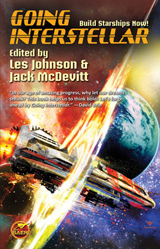
Going Interstellar
Essays by space scientists and engineers on the coolest ways and means to get humanity to the stars along with stories by an all-star assortment of talespinners abounding with Hugo and Nebula award winners: Ben Bova, Mike Resnick, Jack McDevitt, Michael Bishop, Sarah A. Hoyt and more. Some humans may be content staying in one place, but many of us are curious about what’s beyond the next village, the next ocean, the next horizon. Are there others like us out there? How will we reach them? Wonderful questions. Now get ready for some highly informative and entertaining answers. Download the comprehensive Teacher’s Guide here.
Essays by space scientists and engineers on the coolest ways and means to get humanity to the stars along with stories by an all-star assortment of talespinners abounding with Hugo and Nebula award winners: Ben Bova, Mike Resnick, Jack McDevitt, Michael Bishop, Sarah A. Hoyt and more.
Some humans may be content staying in one place, but many of us are curious about what’s beyond the next village, the next ocean, the next horizon. Are there others like us out there? How will we reach them?
Wonderful questions. Now get ready for some highly informative and entertaining answers.
Download the comprehensive Teacher’s Guide here.

Select the format you would like to download:
Download Unzipped Files
EPUB/Kindle/Apple iOS/Nook Format
Download Zip Files
EPUB/Kindle/Apple iOS/Nook Format Zip
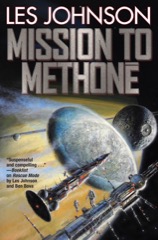
Mission to Methonē
The year is 2065 and an accidental encounter in space leads to the discovery that we are not alone in the universe—and that our continued existence as a species may be in jeopardy. Chris Holt, working in his office at the Space Resources Corporation, discovers that one of the asteroids he is surveying for mining is actually not an asteroid at all but a derelict spaceship. The word gets out and soon the world's powers are competing to explore and claim for themselves the secrets that it holds. What they don't know is that across the galaxy, a war has been underway for millennia. A war between alien civilizations that have very different ideas about what should be done about emerging spacefaring civilizations like our own. The artificial intelligence resident in the derelict Holt discovered has been in our solar system since before the dawn of human civilization, watching, waiting and keeping quiet lest the interstellar war return and wipe out the sentient race that now resides there—humanity. And that war might soon be again coming to our front door. The truth can only be discovered on Methone, a tiny, egg-shaped moon of the planet Saturn. Who will get there first? And will it be in time?

The year is 2065 and an accidental encounter in space leads to the discovery that we are not alone in the universe—and that our continued existence as a species may be in jeopardy.
Chris Holt, working in his office at the Space Resources Corporation, discovers that one of the asteroids he is surveying for mining is actually not an asteroid at all but a derelict spaceship. The word gets out and soon the world's powers are competing to explore and claim for themselves the secrets that it holds.
What they don't know is that across the galaxy, a war has been underway for millennia. A war between alien civilizations that have very different ideas about what should be done about emerging spacefaring civilizations like our own. The artificial intelligence resident in the derelict Holt discovered has been in our solar system since before the dawn of human civilization, watching, waiting and keeping quiet lest the interstellar war return and wipe out the sentient race that now resides there—humanity.
And that war might soon be again coming to our front door. The truth can only be discovered on Methone, a tiny, egg-shaped moon of the planet Saturn. Who will get there first? And will it be in time?


Select the format you would like to download:
Download Unzipped Files
EPUB/Kindle/Apple iOS/Nook Format
Download Zip Files
EPUB/Kindle/Apple iOS/Nook Format Zip
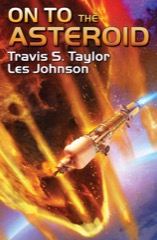
On to the Asteroid
Realistic thriller crackling with action and danger as an asteroid threatens the Earth, and dedicated astronauts and scientists try to save the planet. LOOMING DESTRUCTION FROM SPACE! It's the beginning of a new golden age of space exploration. Finally, humanity is taking the commercialization of space to the next level—mining asteroids. The new gold rush of the commercial space era has begun. Another commercial venture, an attempt to put a hotel on the Moon, is seeking the space tourism gold of the ultra wealthy. And it seems as if the dream of finally sending people to Mars is finally going to happen using a ship propelled by a powerful nuclear rocket. But space travel isn’t cut and dry, and there is nothing routine about it. In order to mine an asteroid the goal is to bring it closer to Earth, but orbital mechanics are tricky and close to Earth proves to be far too close for comfort—with looming destruction from space about to become a grim reality. Now astronauts, scientists, engineers, and people in all the burgeoning space businesses must team together to stop the asteroid before it is too late for humanity and the planet it calls home.
Realistic thriller crackling with action and danger as an asteroid threatens the Earth, and dedicated astronauts and scientists try to save the planet.
LOOMING DESTRUCTION FROM SPACE!
It's the beginning of a new golden age of space exploration. Finally, humanity is taking the commercialization of space to the next level—mining asteroids. The new gold rush of the commercial space era has begun.
Another commercial venture, an attempt to put a hotel on the Moon, is seeking the space tourism gold of the ultra wealthy. And it seems as if the dream of finally sending people to Mars is finally going to happen using a ship propelled by a powerful nuclear rocket.
But space travel isn’t cut and dry, and there is nothing routine about it. In order to mine an asteroid the goal is to bring it closer to Earth, but orbital mechanics are tricky and close to Earth proves to be far too close for comfort—with looming destruction from space about to become a grim reality. Now astronauts, scientists, engineers, and people in all the burgeoning space businesses must team together to stop the asteroid before it is too late for humanity and the planet it calls home.

Select the format you would like to download:
Download Unzipped Files
EPUB/Kindle/Apple iOS/Nook Format
Download Zip Files
EPUB/Kindle/Apple iOS/Nook Format Zip

Select the format you would like to download:
Download Unzipped Files
EPUB/Kindle/Apple iOS/Nook Format
Download Zip Files
EPUB/Kindle/Apple iOS/Nook Format Zip

Rescue Mode
The first human mission to Mars meets with near‑disaster when a meteoroid strikes the spacecraft, almost destroying it. The ship is too far from Earth to simply turn around and return home. The eight‑person crew must ride their crippled ship to Mars while they desperately struggle to survive. On Earth, powerful political forces that oppose human spaceflight try to use the accident as proof that sending humans into space is too dangerous to continue. The whole human space flight program hangs in the balance. And if the astronauts can’t nurse their ship to Mars and back, the voyagers will become either the first Martian colonists—or the first humans to perish on another planet. Listen to the authors discuss the book here on the Baen Free Radio Hour.
The first human mission to Mars meets with near‑disaster when a meteoroid strikes the spacecraft, almost destroying it. The ship is too far from Earth to simply turn around and return home. The eight‑person crew must ride their crippled ship to Mars while they desperately struggle to survive.
On Earth, powerful political forces that oppose human spaceflight try to use the accident as proof that sending humans into space is too dangerous to continue. The whole human space flight program hangs in the balance. And if the astronauts can’t nurse their ship to Mars and back, the voyagers will become either the first Martian colonists—or the first humans to perish on another planet.
Listen to the authors discuss the book here on the Baen Free Radio Hour.

Select the format you would like to download:
Download Unzipped Files
EPUB/Kindle/Apple iOS/Nook Format
Download Zip Files
EPUB/Kindle/Apple iOS/Nook Format Zip
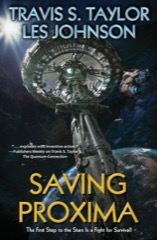
Saving Proxima
The year is 2072. At the lunar farside radio observatory, an old-school radio broadcast is detected, similar to those broadcast on Earth in the 1940s, but in an unknown language, coming from an impossible source, and originating at an equally impossible location—Proxima Centauri. While the nations of Earth debate making first contact, they learn that the Proximans are facing an extinction-level disaster, forcing a decision: will Earth send a ship on a multiyear trip to provide aid? Interstellar travel is not easy, and by traveling at the speeds required to arrive before disaster strikes at Proxima, humans will learn firsthand the effects of Einstein’s Special Relativity and be forced to ponder the ultimate of questions: “Are we alone in the universe?” and “What does it mean to be human?”
The year is 2072. At the lunar farside radio observatory, an old-school radio broadcast is detected, similar to those broadcast on Earth in the 1940s, but in an unknown language, coming from an impossible source, and originating at an equally impossible location—Proxima Centauri. While the nations of Earth debate making first contact, they learn that the Proximans are facing an extinction-level disaster, forcing a decision: will Earth send a ship on a multiyear trip to provide aid?
Interstellar travel is not easy, and by traveling at the speeds required to arrive before disaster strikes at Proxima, humans will learn firsthand the effects of Einstein’s Special Relativity and be forced to ponder the ultimate of questions: “Are we alone in the universe?” and “What does it mean to be human?”

Select the format you would like to download:
Download Unzipped Files
EPUB/Kindle/Apple iOS/Nook Format
Download Zip Files
EPUB/Kindle/Apple iOS/Nook Format Zip
Customer Ratings for Starwolves and the Interstellar Patrol






